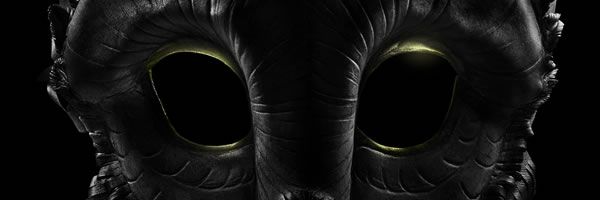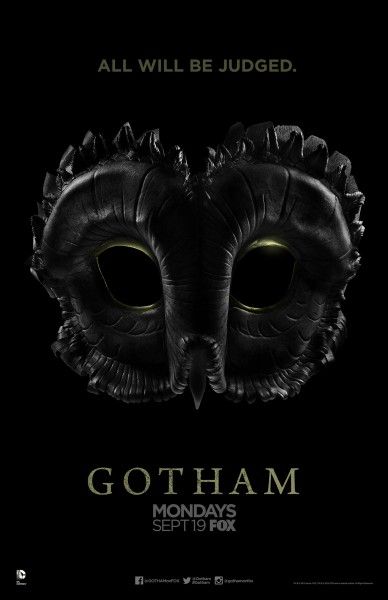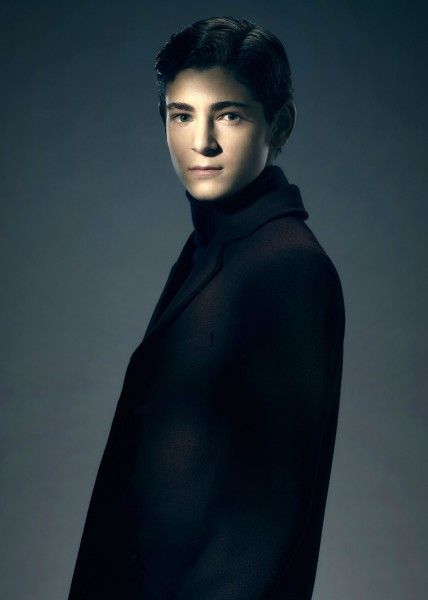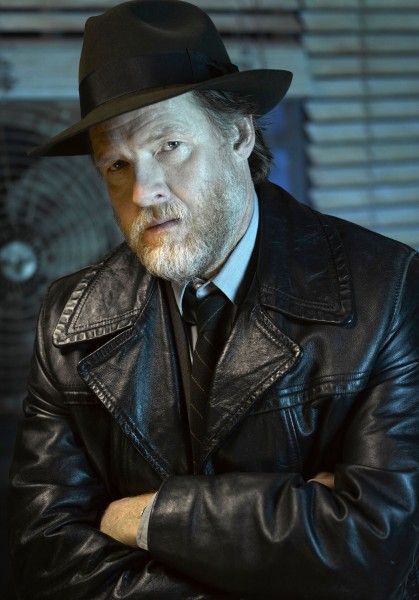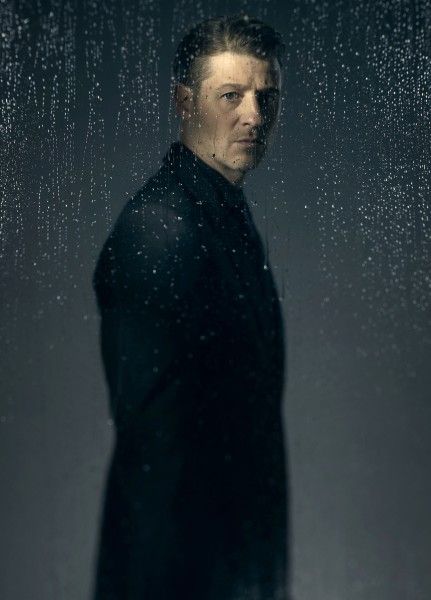With the subtitle of Season 3 of the Fox series Gotham being “Heroes Will Fall,” the stakes are higher than ever, the super-villains are more ambitious and depraved, and a realignment of alliances shakes up the fight for power in the city. The Indian Hill escapees are on the loose and Jim Gordon (Ben McKenzie) is taking matters into his own hands as a bounty hunter, while Bruce Wayne (David Mazouz), his butler and mentor Alfred (Sean Pertwee), and former Wayne Enterprises employee Lucius Fox (Chris Chalk) begin to peel back the curtain on the infamous criminal organization known as the Court of Owls.
During this exclusive interview, co-executive producer Ken Woodruff sat down with Collider at the TCA Summer Press Tour to preview what’s to come in Season 3. He talked about why many of the heroes we’ve come to know will have to fall, how dangerous the Court of Owls is, what to expect from Bruce Wayne’s doppleganger, the strained friendship between Jim Gordon and Harvey Bullock (Donal Logue), and just how much Ivy (Maggie Geha) has changed. Be aware that there are some spoilers.
Collider: What can you say about the story you’re telling with Season 3, since “Heroes Will Fall” seems very ominous?
KEN WOODRUFF: For the second season, we really wanted to show how villains became the super-villains that they are in the world of the comic books. The other side of that is that you also have to have your heroes fall. There needs to be that vacuum of power and the fight needs to be one-sided. In order to take Gotham from the place that it was in Season 1 to the place that it needs to be for Batman to arrive, one of the biggest pieces of that was the heroes falling off, dying and turning evil. The people that were making up the army that was fighting these super-villains is falling off, one by one.
How dangerous will the Court of Owls be, not only to the heroes of Gotham, but also to the villains?
WOODRUFF: What’s interesting about the Court of Owls is that it operates, weirdly, in the best interest of Gotham, or in the best interest of themselves. Sometimes those interests are counter to the heroes of Gotham, but sometimes they’re aligned with them. So, what’s nice about a group like the Court of Owls is that you can really keep their motivations and actions mysterious. You never know, from one move to the next, if they’re going to be aiding these villains, banding them together and helping them, or are they going to feel like these villains are gaining too much power and throwing off the balance in Gotham. That’s the most interesting part about it. They can really play God and act as the devil.
What are you looking to achieve with the Bruce Wayne doppleganger?
WOODRUFF: There are some plot moves and story stuff that we’re getting into, in the second half of the season. At this show’s core, if it weren’t for the actions and the stories that we see on screen, there wouldn’t be a Batman. That’s the thing we always go back to. That’s why the relationship that Bruce Wayne has with James Gordon is so important. He gets to learn the lessons that James Gordon learned the hard way. And it’s the same thing with this doppleganger. We’re bringing him in to show Bruce Wayne a lot of things. It’s easier to see things in someone else than it is to see them in yourself. The whole idea of split personalities, like the playboy persona of Bruce Wayne that he uses, to great effect, later on in his life, are the kinds of things that we wanted to have Bruce Wayne learn from this doppleganger. This double comes in and he’s like, “You’re rich! This is great! Why don’t you spend all your money? Let’s go buy a Ferrari!” It’s what a normal 13- or 14-year-old kid should say, especially when you don’t come from money. It just shows everything from a different perspective. It also is a real danger, going forward, because there is this double out there. I can imagine that anyone from the Court of Owls to villains would want to get their hands on him because, if you can pretend to be Bruce Wayne, you can control Wayne Enterprises and you can influence a lot of important people around the city. That could be pretty lucrative and powerful, if you want it to be.
What does Jim Gordon, bounty hunter, look like?
WOODRUFF: Physically, he’s out of the uniform. There have been a couple times, over the years, like in the first episode of Season 2, where he had a civilian look. So physically, he looks a lot different, but it’s much more about his emotional and mental make up. He is a lot more brooding, a lot more intense, and a lot more heartless, in some ways. If James Gordon, the detective for the GCPD, had to be a moral anchor for the people of Gotham, James Gordon, the bounty hunter, is not. He can be much more ruthless in his actions and transactions. He’s really more mercenary in his attitude, which is rough. It’s hard for people like Bruce Wayne, Harvey Bullock and Captain Barnes to see that because, all of a sudden, somebody you thought you could count on is not there anymore.
And it all leaves Harvey Bullock in charge, in a way that he’s never wanted to be.
WOODRUFF: Yeah, absolutely. He’s in charge in a way that he definitely does not want to be. All of a sudden, he’s the man. If you’re a guy that’s made your life being the class clown, it’s hard to be the teacher, all of a sudden. It also puts Harvey in a compromising position with Gordon. Gordon wants to access some of the resources of the GCPD, like files, information and evidence, and the only person he’s going to be able to really go through is Bullock, and that’s going to put Bullock in a really compromising position, again and again and again. The question is, at what point does Gordon become a bad friend for asking Harvey to do the things he’s doing. We really want to play that balance throughout.
At Comic-Con, Michael Chiklis said that the journey his character goes on this season is why he signed on to do the show, and that Episode 4 will be a big episode for him. What can you say about his arc, this season?
WOODRUFF: I think people who were fans of Michael Chiklis before Gotham are going to be thrilled. He really gets to go to a big place, and by that I mean not specifically to the mythology of the show, but to a big character place. Barnes will be going through a real transformative process, and not just in Episode 4, but in 4, 5, 6, 7, 8 and 9, and then again, later on, in the middle of the season. You’re going to see him become someone completely new and take on an entirely new personality. The question is, is that going to be for good or for evil, or somewhere in the middle. But, you’re going to have to wait to see. I don’t want to ruin it.
Also at Comic-Con, Ben McKenzie said that he might become another iconic DC character before this season of Gotham is finished. What does that mean?
WOODRUFF: Both Gordon and Barnes fall under the theme of fallen heroes, and fallen can mean a number of things. It can mean a hero becoming a villain, but it also can mean a villain dying and it can also mean a hero losing the thing that made them a hero, in the first place. There’s lots of different levels. We’re not killing both Barnes and Gordon, but it goes back to the story we’re telling this season, that the heroes of Gotham are losing. There’s different ways for them to lose that, and we’re going to explore different ways with each of those characters. For both of them, it’s going to be really transformative. As actors, they’re going to get to play things they’ve never played before. We’re really going to take them to some dark spots.
We’re going to see a very different Ivy this season. What will that allow you to do with that character?
WOODRUFF: She’s not just older and physically different, but she’s also changed. The events that occur in the end of the first episode and the second episode really change her from that socially odd, abrupt kid to a young woman who is much closer along the path towards the Poison Ivy from the canon that we all love. Part of the change was that Ivy’s signature characteristic power as a villainess is the power of seduction. It helped, in our world, to make Ivy older, or appear to be older, and also have a much more cunning guile to it that the Ivy Pepper we’d established in the show didn’t have.
Will we get to see more of unhinged, crazy Barbara?
WOODRUFF: Yes. I can’t wait for people to see Barbara now. We did that big change with her, from Season 1 to Season 2, and we’ve taken it to 11 with her this season. She’s really, really fun. Every time she’s on screen, she just pops.
And Fish Mooney is back now.
WOODRUFF: Yeah, and not only is she back, but she’s back with a power that is incredible for Fish to have. It’s probably her dream power.
Gotham returns for Season 3 on Fox on September 19th.

